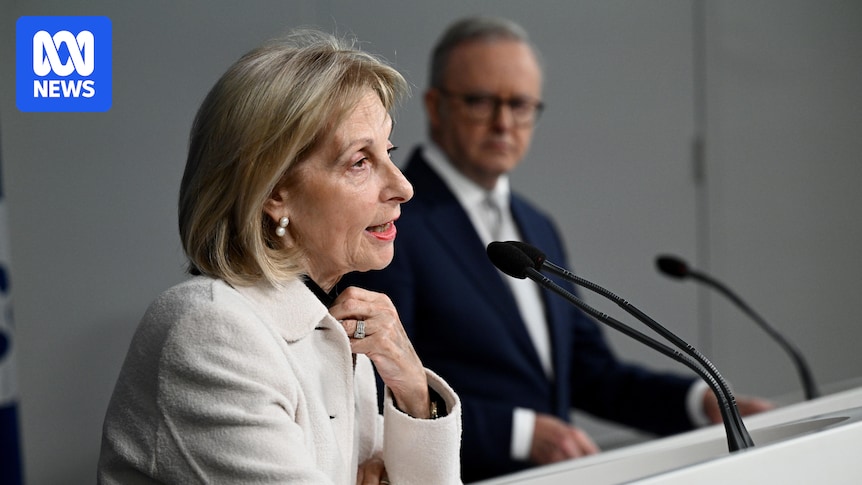The special envoy to combat antisemitism will work with government to withhold funding from universities that fail to reduce hatred against Jewish students, monitor media organisations to ensure accurate coverage, and screen visa applicants for antisemitic views under a sweeping plan launched by the prime minister on Thursday morning.
Special envoy Jillian Segal said she will also work with the government to review Australia’s hate speech laws, including vilification offences and the promotion of hatred.
Ms Segal, who was appointed to the envoy role by the prime minister a year ago, said her plan was a comprehensive, long-term approach to combating antisemitism and introducing a strategy already in place in many other nations.
“We cannot hope to really abolish antisemitism, but we can push it to the margins,” Ms Segal said.
The envoy warned that antisemitism in Australia had become more common since the October 7 Hamas terror attack on Israel, and Israel’s subsequent invasion of Gaza.
“In the space of just one year, reported incidents increased over 300 per cent. These are not isolated events and they form part of a pattern of broader intimidation and violence that is making ordinary Jewish Australians feel very unsafe,” she said.
Standing alongside Ms Segal, Prime Minister Anthony Albanese welcomed her report and said it would now be considered by the government.
Ms Segal has been working on the plan since her appointment, but it has been delivered just a week after another series of antisemitic incidents in Melbourne.
Last week, the entrance of a Melbourne synagogue was set alight, while protesters stormed Israeli-owned restaurant Miznon in the city’s CBD.
“It further illustrates the importance of adopting this,” Ms Segal said.
Jillian Segal says a recent arson at another synagogue in Melbourne illustrates the need for more action. (ABC News: Costa Haritos)
Mr Albanese set the measure of success for himself.
“It will be successful … where students can go to school without any fear, where cultural diversity and expression is flourishing, where people can engage with each other and be enriched by the diversity that is our society,” he said.
Review of hate speech laws
Under the envoy’s plan to combat antisemitism, Ms Segal intends to review federal and state legislation addressing antisemitic and other hateful conduct, including vilification offences.
Those laws were strengthened by the federal government, and last term bans on Nazi symbology were also introduced with strict penalties.
But Ms Segal has continued to advocate for reforms that would criminalise the promotion of hatred.
Under current laws, inciting a person to commit a hate crime is a criminal offence, but it is difficult to prove, and is only triggered if a person’s hateful commentary leads to an act of violence.
Guidance for police would also be developed to assist in applying the laws.
Jillian Segal was appointed antisemitism envoy in 2024. (AAP: Dan Himbrechts)
With the prime minister pointing to social media as one of the causes of a rise in hatred, Ms Segal also recommended regulations that would require social media companies to be more transparent with their algorithms to “prevent the amplification of online hate”.
“In particular, law enforcement should be supported to prioritise the identification and prosecution of those who commit offences online, with cooperation from the host platforms. Group harm should be considered as well as individual harm in framing any law reform,” the envoy wrote.
She noted that a group of envoys globally were already in discussions with the major social media platforms in relation to this.
Segal calls to strip funding from broadcasters, arts events and unis who facilitate antisemitism
Ms Segal warned Australia must prevent “the normalisation of antisemitism”, with the plan including a wide-ranging approach to debate online, in the media and at school and university campuses.
The envoy recommended that she become a monitor of media organisations to encourage “accurate, fair and responsible reporting” to ensure impartiality and balance and to avoid “accepting false or distorted narratives”.
While the envoy said freedom of expression was vital to Australian culture, funding for public institutions like arts galleries, festivals, and public broadcasters should be able to be “readily terminated” where organisations facilitate antisemitism.
“Jewish Australians have historically been highly active in Australian cultural life. Unfortunately, in recent times, there have been many examples of the active and deliberate exclusion of Jewish artists, performers and creatives. Such conduct must be strongly rejected and countered,” she wrote.
Ms Segal would also assess universities with a “report card” of their implementation of practices to combat antisemitism, including complaint systems and policies to ensure Jewish students and staff could participate “actively and equally” in university life.
Some Jewish groups have called for a ban on university protest encampments. (AAP Image: James Ross)
Those who failed to act against antisemitism would have government funding withheld where possible, and grants terminated if recipients were found to engage in discriminatory or hateful speech.
Ms Segal also raised concerns with investigating foreign sources of funding for “antisemitic activities and academics” at universities.
A judicial inquiry would be established into campus antisemitism by the start of the 2026 academic year if the envoy determined matters had remained unaddressed.
She noted that there was a marked difference in the experiences of younger Jewish Australians and older Jewish Australians, and that education was needed in schools and universities to improve understanding of Jewish culture.
